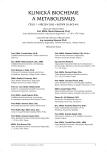-
Medical journals
- Career
Report on biotin and its interferences in immunoanalytical methods
Authors: B. Friedecký 1,2; J. Kratochvíla 2
Authors‘ workplace: ÚKBD FN Hradec Králové 1; SEKK Pardubice 2
Published in: Klin. Biochem. Metab., 28, 2020, No. 1, p. 20-23
Overview
Elevated concentrations of exogenous biotin in serum makes interferences in immunoanalytical measurements based on using strepravidin-biotin linkage. Interferences are negative in cases of noncompetitive methods and positive in competitive methods. Elevation of serum biotin causes its use in therapy and very often in cases using as food supplements. Elevation of biotin may be 300-10000 times higher than concentration without addition of exogenous biotin. Interferences of biotin are extremely dependent on method and analytes. Potential interferences are possible in more than 50 analytes measured by immunoanalytical methods, namely of steroid hormones, cardiac markers, tumour markers, some therapeutic drugs and others. Necessity of biotin interference problem lead to creating some important guidance’s, warnings and requirements introduced in this work.
Keywords:
Biotin – streptavidin – interference – immunoanalytical methods – dose of biotin
Sources
1. The FDA Warns that Biotin May Interfere with Lab Test.November 2017. Dostupné na:https://www.fda.gov/medical-devices/safety/communicationns
2. AACC Academy. 1 AACC Guidance Document on Biotin Interferences in Laboratory Tests. Dostupné na: https://www.aacc.org
3. Lab Test Online. Biotin Affects some Blood Test Results. March 2019 Dostupné na: https://Labtestsonline.org
4. European Medicines Agency. Biotin-Interference with Clinical Laboratory Tests January 2019. Dostupné na: http://www.sukl.cz/Leciva/doporuceni-prac-k-farmakovigilancnim-signalum-2019?highlightWords=biotin
5. Li, P., Ferguson, A., Cervinski, H. A. et al.: Beautiful Skin but Erroneous Lab Results. 71th AACC Annual Scientific Meeting, Anaheim CA, USA August 7, 2019.
6. Lackner, K. J.: Cardiac biomarkers 2019. Clin. Chem. Lab. Med., 2019, 57, p. 565-566.
7. Saenger, A. K., Jaffe, A. S., Body, R., Body, R., Collinson. P. O. et al. Cardiac troponin and natriuretic peptide analytical interferences from hemolysis and biotin: educational aids from the IFCC Committee on Cardiac Biomarkers (IFCC C-CB). Clin. Chem. Lab. Med, 2019, 57/5, p. 633-640.
8. Frame, I. J., Joshi, P. H., Mwangi, C., Gunsolus, I., De Lemos, J. A. et al. Susceptibility of cardiac troponin assays to biotin interference. Am. J Clin. Pathol. 2019, 1 51/5, p. 486-493.
9. Bevins, N., Hubbard, J. A., Fitzgerald, R. L., Kelner, M. J. A dilution method to mitigate biotin interference in cardiac troponin T testing. J Appl. Lab. Med., 2019, 4/3, p. 415-421.
10. Trambas, C., Lu, Z., Yan, T., Sikaris, K. Characterization of the scope and magnitude of biotin interference in susceptible Roche Elecsys competitive and sandwich immunoassays. Ann. Clin. Biochem., 2018, 55/2, p. 205-215.
11. Piketty, M. L., Polak, M., Flechtner, I., Gonzales-Briceňo, L., Souberbielle, J. C. False biochemical diagnosis of hyperthyroidism in streptavidin-biotin-based immunoassays: the problem of biotin intake and related interferences. Clin. Chem. Lab. Med., 2017, 55/6, p. 780-788.
12. Ruth, I., Mathieu, E., Burniat, A., Fage, D., Cotton, F. et al. Interferences in free thyroxine concentration using the Roche analytical platform: improvement of the third generation. Clin. Chem. Lab. Med., 2020, 58/2, p. e36-e39.
13. Haslam, S., Oakey, J., Brown, A., Bradshaw, S., Myers, M. A comparison of biotin interference in routine immunoassays of the Roche Cobas 8000, Beckman Coulter DXi and Siemens Advia Centaur XPT immunoassay platforms. Clin. Chem. Lab. Med., 2019, 57/11, p. e287-e290.
14. Bowen, R., Benavides, R., Colón-Franco, J. M., Katzman, B. M., Muthukumar, A. et al. Best practices in mitigating the risk of biotin interference with laboratory testing. Clin. Biochem. 2019, doi:10.1016/j.clinbiochem.2019.08.012.
15. Gilford, J. L., de Koening, L., Hossein Sadrzadeh, S. M. Strategies for mitigating risk posed by biotin interference on clinical immunoassays. Clin. Biochem., 2019, 65, p. 61-63.
16. Charles, S., Agrawal, M., Blum, N. Erroneous thyroid diagnosis due to over-the-counter biotin. Nutrition 2019, 57, p. 257-258.
17. Li, J., Wagar, A., Meng, Q. H.: Comprehensive assessment of biotin interference in immunoassays. Clin. Chim. Acta 2018, 487, p. 293-298.
18. Luong, J. H. T., Male, K. B., Glennon, J. D. Biotin interference in immunoassays based on biotin-streptavidin chemistry. An emerging threat. Biotechnol. Adv. 2019, 37/5, p. 634-641.
19. Grimsey, P., Frey, N., Bendig, G., Zitzler, J., Lorenz, O. et al. Population pharmacokinetics of exogenous biotin and the relationship between biotin serum levels and in vitro immunoassay interference. Int. J Pharmacokinetics 2017, doi:10.4155/ipk-2017-0013.
20. Piketty, M. L., Prie, D., Sedel, F., Bernard, D., Hercent, C. et al. High-dose biotin therapy leading to false biochemical endocrine profiles: validation of a simple method to overcome biotin interference. Clin. Chem. Lab. Med., 2017, 55/6, p. 817-825.
21. Novotná J.: Biotin: riziko interference? Labor Aktuell 2019, 3 : 43-45.
22. Mitigating Biotin Interference in Two Roche Immunoassays by Premixing Biotinylated Capturing Molecules With Streptavidin Coated Beads. Clin Chim Acta., 2020, 505, p. 130-135.
Labels
Clinical biochemistry Nuclear medicine Nutritive therapist
Article was published inClinical Biochemistry and Metabolism

2020 Issue 1-
All articles in this issue
- Doporučení ČSKB
- Nový koronavirus 2019. Pár základních informací a jejich dostupnost.
- Pathobiochemistry of inhibin A and its use in the screening of congenital developmental defects.
- Nephrocalcinosis after kidney transplantation as a rare manifestation of parathyroid carcinoma
- RNDr. Ivan Bilyk
- Report on biotin and its interferences in immunoanalytical methods
- Doporučení České společnosti klinické biochemie k jednotkám výsledků měření
- Doporučení České společnosti klinické biochemie a České myelomové skupiny k laboratorní diagnostice monoklonálních gamapatií
- Doporučení: Systém externího hodnocení kvality (EHK)
- Progressive familial intrahepatic cholestasis in adulthood: 60 years’ follow-up
- Clinical Biochemistry and Metabolism
- Journal archive
- Current issue
- Online only
- About the journal
Most read in this issue- Doporučení: Systém externího hodnocení kvality (EHK)
- Doporučení ČSKB
- Doporučení České společnosti klinické biochemie k jednotkám výsledků měření
- Pathobiochemistry of inhibin A and its use in the screening of congenital developmental defects.
Login#ADS_BOTTOM_SCRIPTS#Forgotten passwordEnter the email address that you registered with. We will send you instructions on how to set a new password.
- Career

